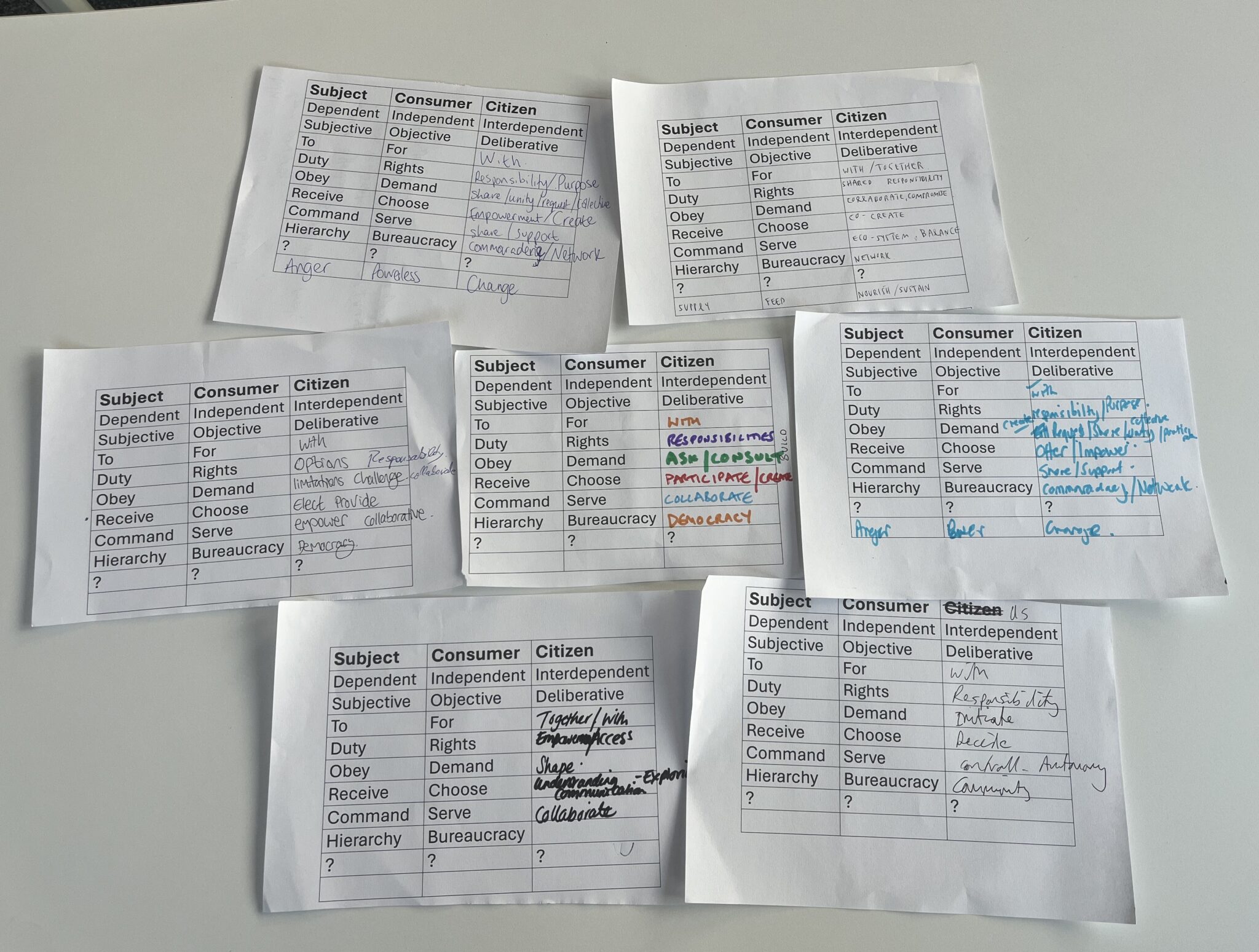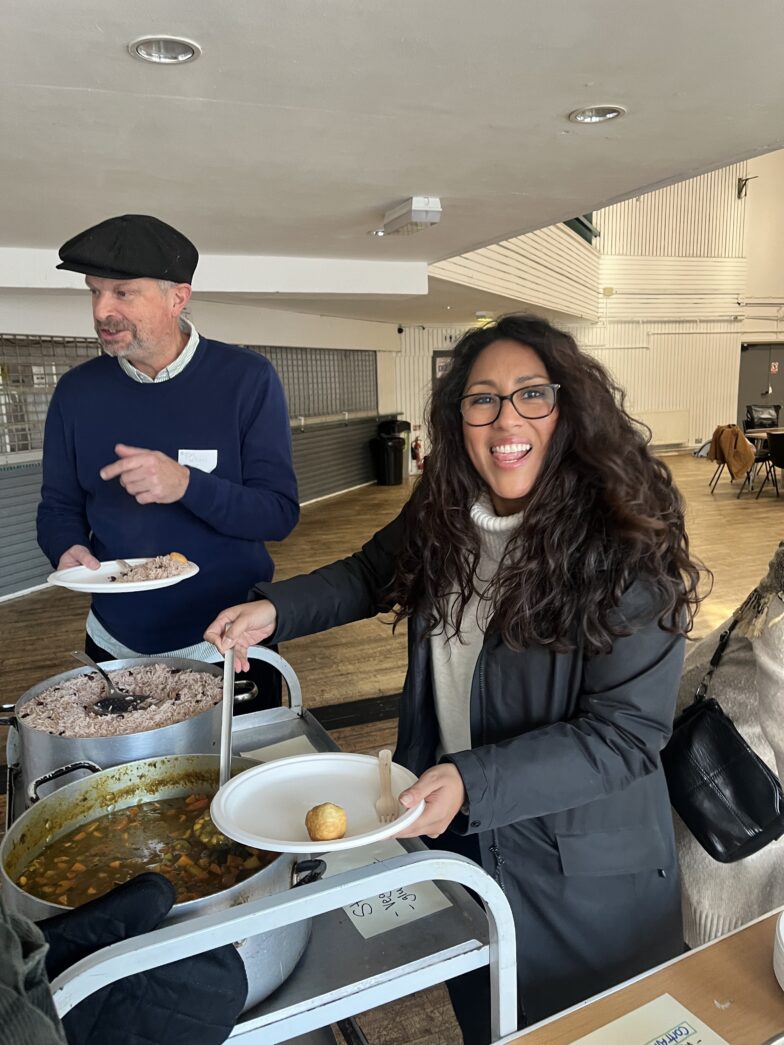
This blog was originally posted on the Feeding Bristol website – see here.
Words by Mali Evans, Head of Engagement and Advocacy at Feeding Bristol.
Feeding Bristol’s final event of the year was an opportunity to galvanise some of that amazing community energy as we head into 2025. Organisations and individuals working on an array of food projects, from community kitchens to market gardens, joined us at the Malcolm X Centre on a fresh and sunny November morning.
The theme of the event was ‘channelling our collective power’, which is essential for building the foundations of resilience needed to address inequality and make Bristol a city of Food Justice. In this blog we talk about ideas explored at the event and our reflections on collective action as we see another challenging year come to a close.
Food Citizenship: a brief introduction
We began the session by exploring Food Citizenship, a framework we were excited to share after discovering the fantastic work and resources produced by the Food Ethics Council and New Citizen Project (see ‘resources’ below). Food Citizenship asks us to question the mindset that sees people as ‘consumers’ in our food system and invites us instead to think about the possibilities that open up when we see ourselves, and others, as food citizens. We shift from being passive recipients to active contributors, giving an opportunity for the food system to be shaped by our shared health and wellbeing rather than being driven by the need to cut costs.

In groups, we discussed the limitations of the ‘consumer mindset’ and the power of language in shaping our beliefs, before thinking of words that would feel more empowering to use to talk about our food system.
Our final discussion point around Food Citizenship was a challenging one! If the problems we try to address in our work on food insecurity are based on a ‘consumer mindset’, then using a ‘citizenship mindset’ would bring up a different problem, and potentially open our minds to new solutions. Groups delved deep to consider how we could reframe the problem, and what question we would need to ask to find new solutions. Here are some of the ideas from the session as well as the example from the resources.
Ideas from the session
The problem: there is a disconnect between abundance, availability and value of food
The question: how do we make high quality food distribution accessible and equitable?
–
The problem: people are not supported well enough to be healthy
The question: how can we make sure everyone is supported to have a good life?
–
The problem: food is treated as a profitable commodity
The question: how do we reconnect food to its real purpose – health and nourishment?

From the buzz in the room, it was clear that we could have spent all morning discussing these ideas, and it seems that the chance to take a step back and think more broadly about the food system was welcomed.
Finding common aims
For the latter half of the session, we turned our attention back to Bristol and the inspiring food projects in the room. We touched on the community-capacity framework, which encourages us to think of the capacities that food projects help strengthen, such as increased skills, improved confidence and more community infrastructure. Small groups discussed the capacities their projects had in common, and even though the projects themselves were very different, they found that they had many similar outcomes. Be it connecting communities, addressing isolation or creating spaces of belonging, the achievements of each project stretched far beyond the role of offering food and helped build community resilience.
Imaginative collaboration
The final task was an exercise in using our imaginations to find ways to collaborate. The shared capacities of the previous task became the ‘key aims’ for this activity, and each group spent some time developing ideas for an imaginary joint funding bid. By pooling ideas and resources and using food as a vehicle for positive change, every group was able to think of ways they could use their collective power to achieve some of their shared aims.
We ended the session by bringing the tables together and eating a delicious vegan Caribbean curry cooked by Glen of Glen’s Kitchen – a wonderful community café in St Pauls. Thank you, Glen!

Take aways for 2025
In 2024, we’ve been lucky enough to come together regularly to share thoughts and ideas about driving food equality in the city. With the various challenges communities face, there has been a common observation: poverty is an isolating force. It cuts off individuals, families and whole communities, and creates a climate of stigma and distrust. We know that poverty’s roots are deeply entangled with those of structural inequality and oppression, and that these all thrive on an outlook that prioritises the individual. It may seem like too simple or obvious a thing to take a stance on, but the more of us who declare our belief in citizenship and unity in 2025, the more we can unravel harmful mindsets and harness our power to think and act collectively.
Feeding Bristol has full confidence in our communities to build resilience and collaborate to challenge inequality – and we look forward to another year of working together for Food Justice.
Resources
Food Ethics Council – Food Citizenship
Food Ethics Council – Food Citizenship Website